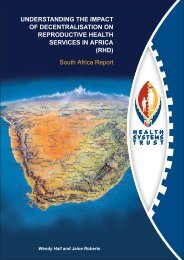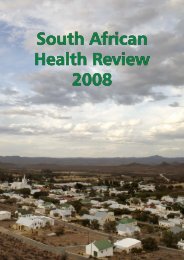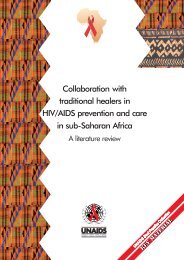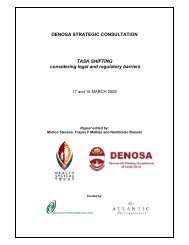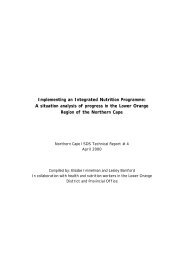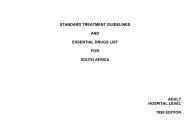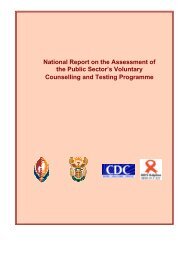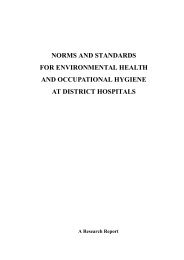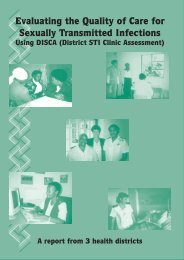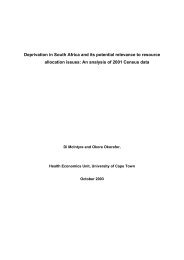SAHR 2007 - Health Systems Trust
SAHR 2007 - Health Systems Trust
SAHR 2007 - Health Systems Trust
You also want an ePaper? Increase the reach of your titles
YUMPU automatically turns print PDFs into web optimized ePapers that Google loves.
<strong>Health</strong> Information <strong>Systems</strong> in the Private <strong>Health</strong> Sector 6<br />
Medical scheme administrators<br />
Medical scheme administrators perform administrative functions<br />
on behalf of medical schemes in terms of a contract<br />
or agreement between the two parties. The conduct of all<br />
administrators is authorised by the CMS through an accreditation<br />
process which ensures that a common standard of<br />
administrative competency is maintained. 11<br />
Administrators play an important role in the health information<br />
system. Not only do they collect, store and process<br />
health information, but they also ensure that confidentiality<br />
of personal health information is maintained directly within<br />
the administrator or through downstream contracting with<br />
data transmission companies or any other party.<br />
Standardisation of health<br />
information<br />
Over time, there has been significant improvement in data<br />
collection processes in the private health sector. However,<br />
standardisation of data remains a challenge resulting in<br />
poor comparability and lack of integration of data into the<br />
broader health information system. The information needed<br />
to monitor access, quality and equity is still inadequate.<br />
The process of standardisation of data principles and<br />
practices in the medical schemes industry received major<br />
impetus in 2001 with the formation of a Committee on<br />
Standardisation of Data and Billing Practices under the<br />
auspices of the CMS. This Committee sought to address<br />
some of the concerns raised by health care providers,<br />
medical schemes and administrators with regards to standardisation<br />
of data and billing practices, as required in terms<br />
of the Medical Schemes Act. The Committee recommended<br />
that standards be developed for the following key aspects:<br />
diagnosis coding; procedure coding; coding of pharmaceuticals;<br />
electronic messaging; and confidentiality. This was<br />
followed by other processes such as the National Task Team<br />
on ICD-10 implementation.<br />
Private <strong>Health</strong> Information Standards<br />
Committee<br />
The Private <strong>Health</strong> Information Standards Committee (PHISC)<br />
is an established organisation of private health sector stakeholders<br />
concerned with health information standards in South<br />
Africa. The principal objective of the PHISC is to communicate<br />
and reach consensus on implementation guidelines, to<br />
monitor national health information standards in the private<br />
health industry and to achieve this with maximum cooperation<br />
with government and other interested parties. 12<br />
As there are currently no clearly defined and well coordinated<br />
strategies for the development and implementation of<br />
a private health information system in South Africa, the PHISC<br />
has occasionally functioned as a forum for overseeing the<br />
broad health information needs of the private health sector.<br />
Members of the PHISC are actively involved in the ICD-10<br />
implementation Task Team.<br />
The current activities of the PHISC reflect the following key<br />
issues that need to be addressed in the private health care<br />
environment.<br />
➤ Diagnosis and procedure coding<br />
➤ Pharmaceutical codes<br />
➤ Message standards<br />
➤ Privacy and confidentiality<br />
➤ Standardised claim forms<br />
Diagnosis coding<br />
The International Classification of Diseases (ICD), which is<br />
published and maintained by the World <strong>Health</strong> Organization<br />
(WHO) is designed to promote international comparability in<br />
the collection, processing, classification, and presentation of<br />
morbidity and mortality statistics. 13 The ICD-10 (the tenth revision<br />
of ICD) was accepted as the national standard for diagnosis<br />
coding for both the public and private health sectors<br />
in 1995. However, the process of national implementation<br />
of this standard in South Africa commenced at the beginning<br />
of 2004 with the formation of a National Task Team on<br />
ICD-10 implementation. A broad consultative process was<br />
established that included the CMS, the DoH and a variety of<br />
industry stakeholders. The primary purpose was to develop<br />
an implementation plan for the ICD-10 that was applicable<br />
to both the public and private health sectors. The benefit<br />
of this initiative has been the standardisation of diagnosis<br />
in the industry, improved clinical and risk management<br />
by schemes, speedy and appropriate reimbursement of<br />
providers, improved access to benefits by medical scheme<br />
beneficiaries and improved quality of morbidity data.<br />
In South Africa, the ICD-10 coding system was formally<br />
introduced in the private health sector in July 2005 and is<br />
currently used by all medical schemes and administrators,<br />
health care providers, managed care organisations and<br />
other parties in the public and private sectors for the clas-<br />
95



